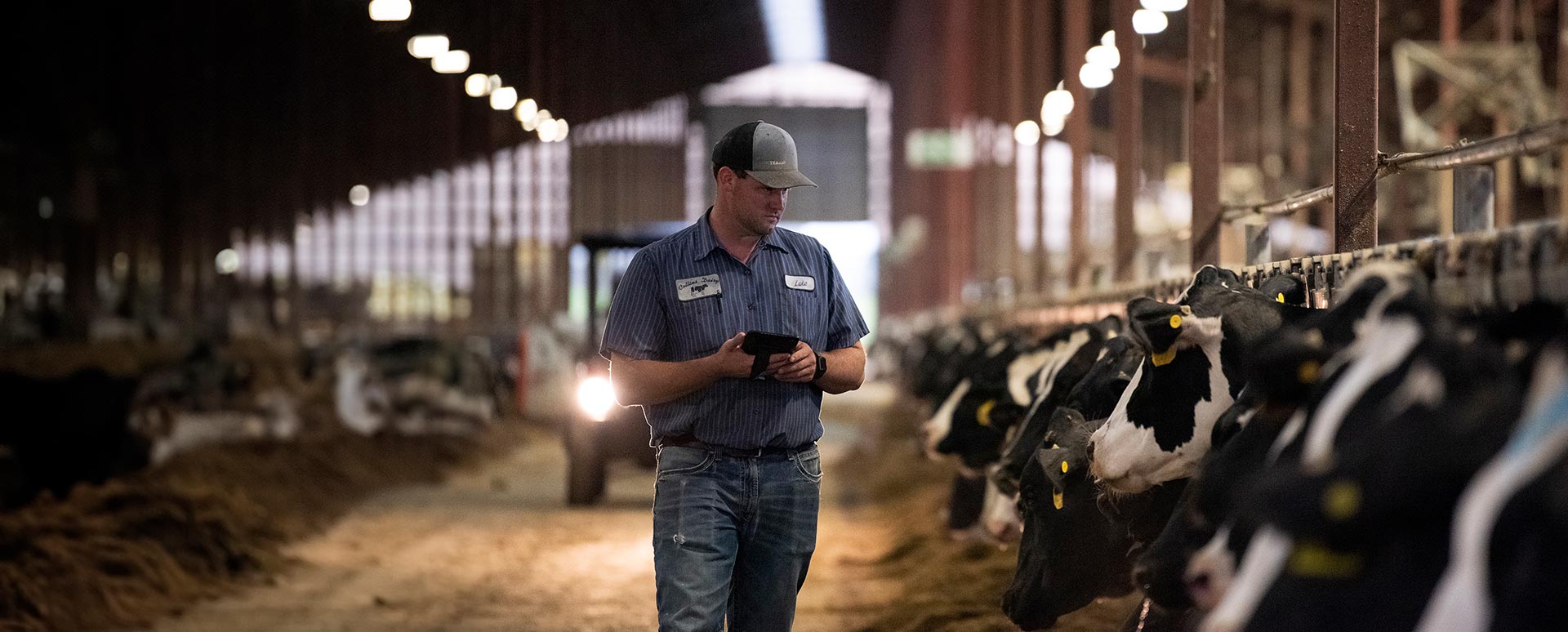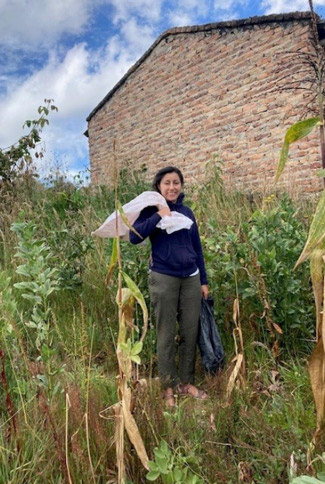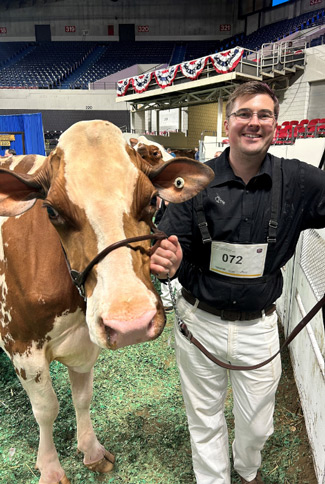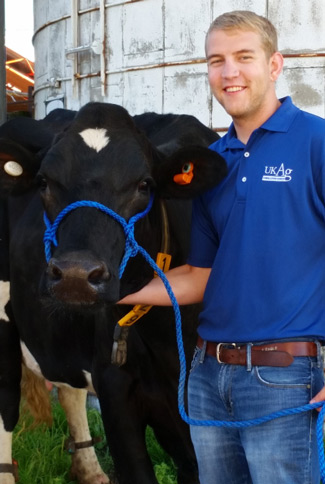
Unlocking the hidden potential of the biological blueprint
Through genetics and precision analytics, scientists aim to transform the future of animal care by enabling healthier and more productive herds.
This audio recording was enabled by AI

Growing up in Colombia, Yeni Bernal Rubio fondly recalls spending time on the family farm caring for cattle. “I remember watching my father carefully selecting which bull was best suited for the next breeding season, and the information in the sires’ catalogs made me curious. I wanted to know how all those numbers were calculated, what they meant and why each bull had different scores. This triggered my interest into animal science and the application of math and statistics, moving into my Master’s and Ph.D., all with focus on genomic selection and prediction.”

Fast forward more than 20 years, and Yeni’s fascination with livestock genetics is stronger than ever. Today, she’s a Zoetis principal scientist working with her team to unlock genetic potential for beef cattle.
Yeni is part of the Genetics and Precision Animal Health group within Zoetis’ research and development organization, where teams of innovators are working to help create a healthier future for animals, livestock producers and the planet.
Herd matters
More than 1 billion cattle1 provide dairy and beef to nourish our world’s growing population. Dairy cattle produced around 881 million tons of milk in 20192; beef cattle produced nearly 58 metric tons of meat from 2014 to 2023.3
“Numbers of this scale are difficult to visualize, but they clearly show the importance of cattle to the world’s population,” said Fernando Di Croce, who leads Livestock Genetics and Precision Animal Health within Zoetis’ R&D organization. “But cattle and livestock producers face multiple challenges and dynamics.”
For starters, diseases keep cropping up and harming herds and farmers’ livelihoods. Meanwhile, farmers are under pressure to be more efficient, increase productivity and safeguard animal welfare, while also reducing their environmental footprint. At the same time, they face labor shortages of livestock veterinarians and farm staff.
"I have a profound appreciation for the challenges farmers are up against and a sincere desire to make a positive impact on rural communities and global food security. It’s the ‘why’ behind the work I do."
Fernando Di Croce, Livestock Genetics and Precision Animal Health
Fernando grew up in a small agriculture town in Argentina, where cow-calf operations in the flourishing wheatfields kept his community going. “I was part of the rhythm of rural life, working as a cowboy and operating harvest equipment during the summer. This connection to the land and animals became an integral part of my identity.”
Today, the teams he leads focus on genetics and predictive analytics that provide insights for the development of therapeutics and vaccines as well as inform cattle producers with genetic and analytical insights to help them better manage herd health and productivity.
Ruminating over the genome
Each animal’s genome provides a landscape of information that can help producers make informed decisions about the management of their cattle to help improve herd health and productivity.
“And when we combine DNA information with on-farm records and other ‘omics’ – proteomics, transcriptomics, metabolomics – producers can get a clear picture of the genetic potential of their animals within their operation, define an optimal breeding program and drive genetic progress in productivity, efficiency and health outcomes, ultimately helping to drive profitability of producers and customers,” said Yeni.
Zoetis has been part of this journey for years and offers products such as genomic tests that help commercial cow-calf beef producers make informed decisions when selecting the best replacement females across eight major breeds for their operations.
‘Milking’ the genome to benefit dairy farmers
Nick Randle grew up on a dairy farm in Indiana and still breeds and shows a few Red and White Holsteins. “I’m passionate about dairy cattle, and I’m passionate about genetics,” said the Brand Manager for Zoetis’ Dairy Genetics, Cattle Reproductives and Milk Quality products. “Historically, farmers made selection decisions based on their experience and visual assessment of the herd – and sometimes they were right and sometimes, wrong. But with genetic testing, we can more accurately predict fertility traits along with wellness traits and the potential for disease.”

For example, mastitis is a common and costly disease across the dairy industry. One out of four dairy cows is affected by mastitis in the U.S., and the disease results in nearly $2 billion a year in lost milk production and treatment costs.4
Zoetis’ CLARIFIDE® Plus is a genetic test that helps determine which cows are less likely to develop mastitis, among many other cow and calf wellness traits for Holsteins and Jerseys. CLARIFIDE Plus is available in over 40 different markets across the globe.
“Early identification of issues related to disease, fertility and productivity helps producers be proactive,” said Nick. “Armed with genetic data, farmers can implement management strategies and identify and breed more cows that have a higher potential to stay healthy and productive.”
Decoding the data
Like Nick, Matthew Borchers grew up taking care of dairy cattle on his family farm. “My brother, my dad and both my grandfathers have been dairy farmers,” said Matthew, who leads the Predictive Analytics group for Precision Animal Health R&D at Zoetis. “The use of data to better manage and care for animals has always fascinated me. I grew up with paper records and digital records. As I got older, computers were used more and more to manage dairy farms. From the data in these records, we can create analytics to better utilize resources, increase efficiency and maximize animal health. I don’t personally farm anymore, but my work is dedicated to cattle and production livestock.”
Livestock Predictive Analytics at Zoetis blend traditional statistics and AI/Machine Learning approaches to analyze large data sets and help identify health problems early in livestock. “We are data scientists and animal scientists. We take the different data sources on farms and answer questions, such as how we can improve reproduction, health, production efficiency or economic viability of a herd,” said Matthew. “We train algorithms to make the right managerial decision at the right time.”

Decoding the data can provide a pasture full of information for farmers. For example, the team of scientists has developed a Mastitis Risk Prediction Algorithm, which identifies animals at risk of developing mastitis before the disease occurs. From here, producers can create attention lists or look into diagnostics to perform on high-risk animals.
And helping farmers be successful is Matthew’s big-picture purpose. “It’s important to me. That’s my family’s livelihood. I want animals to be productive, healthy and sustainable. It’s good for animals, and it’s good for people.”
Only grazing the surface of what’s possible
“Predictive analytics and genetics empower cattle managers with advanced tools to make earlier and data-driven decisions that can help disease and improve productivity,” said Fernando Di Croce. “These insights contribute to more effective and sustainable animal care practices. For instance, using genetic predictions to make management decisions may help farmers improve efficiency and reduce methane emission intensity, with the goal of lowering dairy farm carbon footprints and promoting sustainable dairy farming.”
The bottom line: The Precision Animal Health and Genetics team aims to revolutionize the decision-making process at the farm level, help dairy farmers enhance health and productivity, and create more efficient dairy farming.
“We’ve come a long way, but there’s so much more we can do,” said Fernando. “We have purpose-driven, highly talented researchers and professionals who are passionate about leading a transformative shift in the future of animal care. We do it because we feel a tremendous responsibility for holding the dreams of other people in our hands.”
Published on May 16, 2024
References
1 livestock_poultry.pdf (cornell.edu)
2 Dairy's Global Impact - IDF - IDF is the leading source of scientific and technical expertise for all stakeholders of the dairy chain (fil-idf.org)
3 Beef | USDA Foreign Agricultural Service
4 Incidence and Treatments of Bovine Mastitis and Other Diseases on 37 Dairy Farms in Wisconsin - PMC (nih.gov)
GND-00024